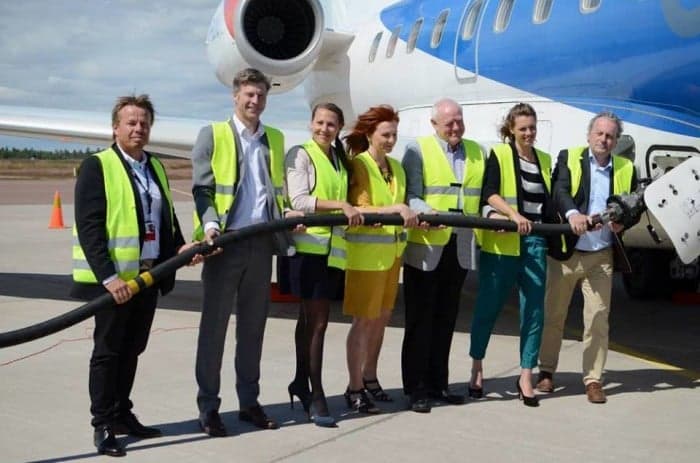'Biofuels critical for climate-friendly flights'
Sweden could become a leading producer of aviation biofuel, but industry efforts to stimulate demand for 'green flights' risk falling short if politicians don’t join the effort.

While it may seem like science fiction to some, jets already fly using biofuel derived from forestry industry by-products or other biomass. And increasing aviation biofuel use is a key component to the industry’s attempts to reduce the environmental impact of air travel.
“Biofuels are the single most important factor in reducing airplanes’ carbon footprint. Fuel-related emissions account for 70 to 80 percent of C02 emissions from flights,” explains Maria Gelin, head of environmental manager at Gothenburg’s Landvetter airport.
Since 2008, the use of biofuel in airplanes has increased steadily. In November 2014, Scandinavian airline SAS finally joined the growing list of airlines which have flown biofuel-powered commercial flights. And just last month, a biofuel blend helped a Malmö Aviation flight lift off from Bromma airport.
Sweden is also home to the first airport in the world to be equipped with a fuelling station dedicated to aviation biofuels. But the milestone remains largely symbolic in the face of aviation biofuel’s limited supply and high price.
“Having a dedicated biofuel pumping station at the airport in Karlstad is great, but right now we still need to import the fuel in order to use it,” says Gelin. “But we’d rather see planes at Karlstad and other Swedish airports filling up with biofuel made in Sweden.”
SEE ALSO: The Local's Connect Sweden ambassador series
Currently, aviation biofuel is only available on a per-order basis and remains three to four times more expensive than regular jet fuel. That extra cost makes it hard for airlines to commit to buying biofuels as they struggle with stiff competition and low margins.
While recent studies carried out by Sweden’s state-owned airport operator Swedavia showed it’s both technically and economically feasible to produce a sustainable supply of aviation biofuel in the Nordic region, lingering uncertainty about sustained demand means potential manufacturers remain reluctant to invest.
“The money simply isn’t there,” says Gelin.
“And things will remain business as usual if politicians don’t act. My fear is that if we continue importing biofuels for airplanes, there’s a danger people will think of it as greenwashing when in reality it’s a huge business opportunity for Sweden.”
In February Swedavia took an important step in developing the Nordic market for aviation biofuels by joining the Fly Green Fund, a Nordic initiative launched in 2014 designed to help cover additional costs associated with buying biofuel relative to regular jet fuel.
By pooling resources from important industry players like Swedavia, SAS, KLM, Malmö Aviation, and others, the Fly Green Fund helps reduce the cost of biofuels. Another measure, tested in conjunction with Almedalen, is allowing individual travellers to purchase biofuel ‘tickets’ for 150 kronor that goes toward the purchase of aviation biofuels.
An aviation biofuel display at Gate Almedalen. Photo: The Local
“Seventy-five percent of the fund goes to covering the difference in price between biofuel and regular jet fuel,” Gelin explains. “The remaining 25 percent is devoted to developing biofuel production and infrastructure.”
If all goes well, all travellers in the Nordics will have the option to pay a little bit more to take a ‘green flight’, an approach Gelin sees as much more flexible and effective at helping the industry reach climate targets than either a tax or calls to reduce air travel overall.
“Many politicians and ordinary citizens don’t realize how dependent we are on flights whether or not we ever board an airplane,” she says. “There’s no alternative out there that allows us to live the modern life we’ve grown accustomed too. Fresh fish, new shoes, fast delivery of internet purchases – that’s all totally dependent on air travel.”
Gelin believes it’s time for politicians and policymakers to realize the vast potential of sustained aviation biofuel production in Sweden.
“Demand for air travel is going to keep increasing and planes are still going to fly, but if we don’t act we’ll miss the opportunity to push things in the right direction,” she says.
“It’s a great investment for Sweden’s future. There’s a huge business opportunity out there, but Sweden’s politicians need to help get it off the ground.”
Gelin adds that biomass from Sweden’s sizeable forestry industry, combined with by-products from livestock processing, provide an ample supply of local raw materials for aviation biofuel production.
“Our aim is that 20 percent of all aviation fuel used in Sweden consist of biofuels by 2020,” she says.
“Aviation biofuel production in Sweden would create jobs and provide a boost to both the forestry and agriculture industries, and help raise Sweden’s green profile even further.”
This article was produced by The Local in partnership with Swedavia
This content was paid for by an advertiser and produced by The Local's Creative Studio.

Join the conversation in our comments section below. Share your own views and experience and if you have a question or suggestion for our journalists then email us at [email protected].
Please keep comments civil, constructive and on topic – and make sure to read our terms of use before getting involved.
Please log in here to leave a comment.